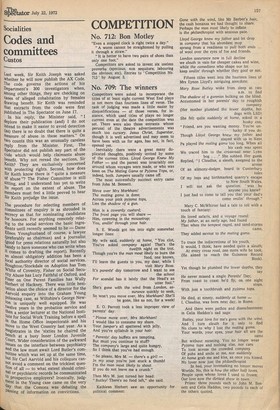Codes and committees custos
Last week, Sir Keith Joseph was asked Whether he will now publish the AX Code. The code governs the actions of his bepartment's 300 investigators when, among other things, they are checking on Cases of alleged cohabitation by females drawing benefit. Sir Keith was reminded that extracts from the code were first PUblished in The Spectator on June 17.
In his reply, the Minister said, "I deplore their publication (and) I do not intend to make it easier to avoid detection (as) there is no doubt that there is quite a measure of abuse in these matters." On two counts this was an unusually careless reply from the Minister. First, The Spectator did not publish any part of the code which would help claimants abuse benefit. Why not reread the sections, Sir Keith? They are exclusively concerned With protecting rights. Second, how does Sir Keith know there is "quite a measure Of abuse "? The Fisher Committee is still sitting, and I understand has yet to write its report on the extent of abuse. The members must feel a little peeved to hear Sir Keith prejudge the issue.
The procedure for selecting members of Committees of enquiry is as shrouded in secrecy as that for nominating candidates for honours. For anything remotely relating to the social services the basic ingredients until recently seemed to be — Dame Eileen Younghusband of course, a lawyer (Preferably as chairman) and a journalist (good for press relations naturally but also andy to have someone who can write when it comes to drafting the report). Recently ian almost obligatory addition has been a „i°oal authority director of social services. rloughton/Stockdale on Adoption has Tom White of Coventry, Fisher on Social Secu,TY Abuse has Lucy Faithful of Oxford, and ruler on One Parent Families has Wally tlerbert of Hackney. There was little hesitation about the choice of a director for the Aarvold enquiry into the Graham Young Poisoning case, as Wiltshire's George Newton is uniquely well equipped. He was twelve years in the probation service and then a senior lecturer at the National Institute for Social Work Training before a spell 10 the Home Office inspectorate and his move to the West Country last year. As a inagistrates in the 'sixties he chaired the bench at a busy Inner London Juvenile Court. Wider consideration of the awkward issues on the interface between psychiatry and the law must await Lord Butler's cornMittee which was set up at the same time, but Sir Carl Aarvold and his collegues cannot avoid a comment on the trickiest questi°n of all — to what extent should criminal or psychiatric records be communicated to prospective employers? Ironically, judg
ent in the Young case came on the very uay that the Comons was debating the Passing of information on convictions.










































 Previous page
Previous page